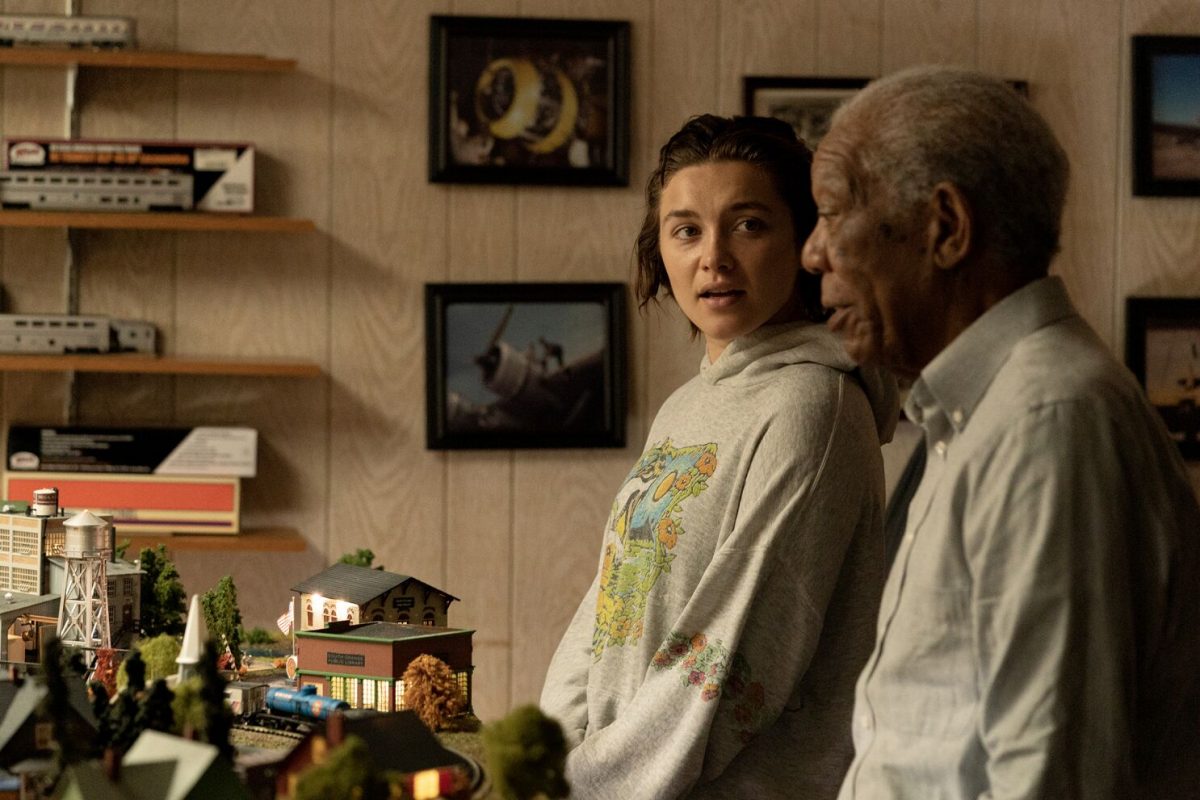Unlike many people of my generation, I am still dazzled by movies. I am in awe of actors’ and directors’ capacity to make fabricated moments between strangers seem so real. Good filmmakers know the ways to pull at people’s heartstrings, whether through loss, nostalgia, intense emotion, or serious monologues. While I stand by that statement, director Zach Braff somehow manages to create a story that includes death, addiction, mental illness, abuse, and Morgan Freeman, which is ultimately unable to produce any semblance of emotion. In fact, instead of leaving A Good Person with a newfound appreciation for life, I found myself wishing I’d left earlier.
The film begins with a typical trope: A happy family is suddenly struck by tragedy, which divides them until they meet some quirky character who is able to lift them up again. A Good Person opens with a newly engaged couple, Allie (Florence Pugh) and Nathan (Chinaza Uche), whose happiness is quickly destroyed by the death of Nathan’s sister, Molly (Nichelle Hines), and her husband as a result of a car crash with Allie as the driver. After the accident, the camera focuses on Nathan, looking distraught as Allie, lying in a hospital bed, comes to and is confronted with the reality of her actions. Then we cut to Allie some years later, no longer engaged, living with her mother, and suffering from a prescription painkiller addiction.
The problem with this opening is that we don’t know who these characters are, so we don’t care. In fact, we don’t even find out the name of Nathan’s sister until the final moments of the movie. It doesn’t help that there is zero romantic chemistry between Pugh and Uche, evidenced by the uncomfortably forced kiss they share. We can’t see what she has lost. Similarly, the relationship between Allie and her own mother, Diane (Molly Shannon), mimics an abusive neighbor who occasionally drops in, drinks, and yells at Allie.
Enter Morgan Freeman.
Freeman takes on the role of Nathan’s dad, Daniel, and caregiver to Molly’s child, Ryan (Celeste O’Connor). Faced with previous problems with addiction as well as the loss of his daughter, Daniel reverts to alcoholism as a coping mechanism. To work through his problems, he begins to attend weekly AA meetings, where he sees Allie for the first time since the accident. Immediately and without explanation, Daniel forces himself to befriend Allie. As a result, Allie begins to confront the life she left behind and create a friendship with Ryan. From here, one would expect the movie to follow the typical ups and downs that come with narratives of addiction, broken families, and unlikely friendships. Instead, Braff decides to swerve off into irrelevant side plots, and we are left with entirely different conclusions.
Braff’s got a stable of good actors, a time-tested movie trope, and realistic issues that affect society, yet somehow nothing works. While some might blame the cast for the lack of emotional connection between characters and the audience, their efforts are wasted by the meandering screenplay. The addiction subplot romanticizes Allie’s struggles—the scenes where she relapses are framed with flashes of happy memories, bright lights, and dance music. Towards the end of the movie, Freeman’s character almost murders a 20-year-old boy in cold blood. Multiple scenes are accompanied by Florence Pugh singing. Why? I couldn’t tell you. The awkward dialogue at times seems improvised. I felt visceral cringe when characters uncomfortably talk over one another and ignore blatant social cues. By the end of the film, I wondered if the screenplay was a first draft.
Maybe it was because I was just glad the movie was wrapping up, but I found the ending to be the best part. Mostly because one of Freeman’s strengths— god-like narration—was finally utilized. Better late than never, Freeman’s narration is meant to convey a sense of peace and closure. It gave me the strength to quickly scamper out of my seat and out the door. Thanks, Morgan Freeman, for at least doing your part.
